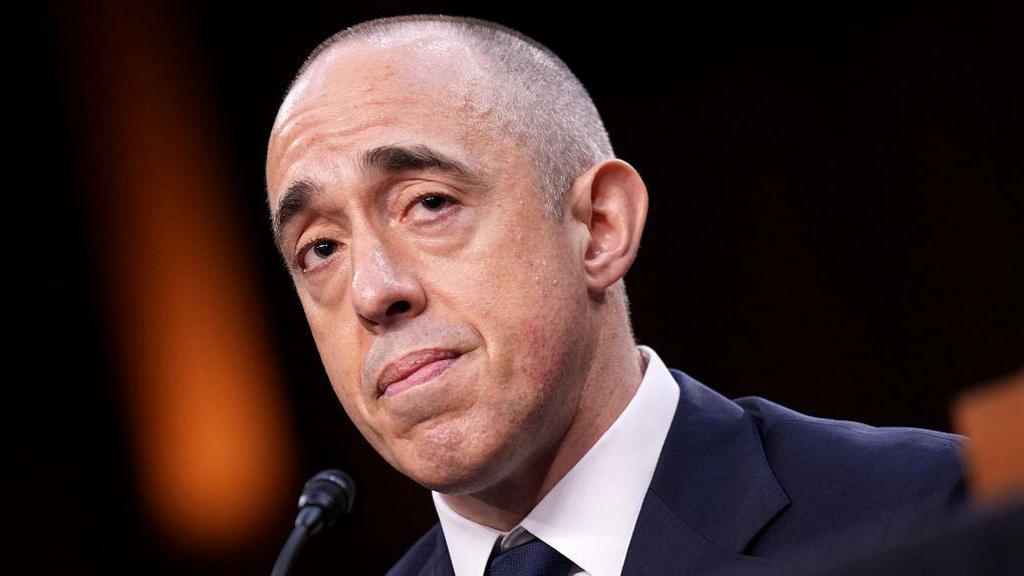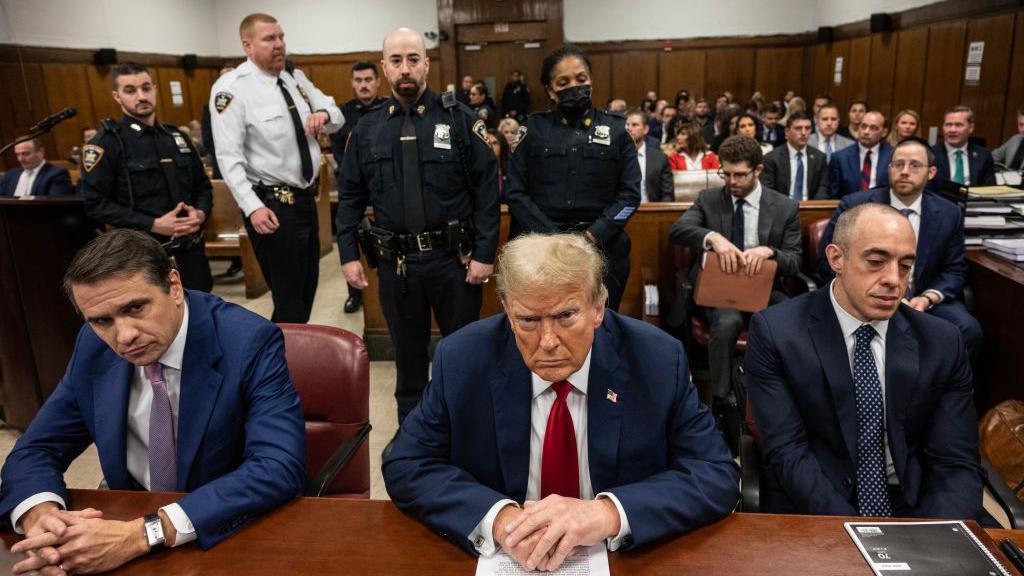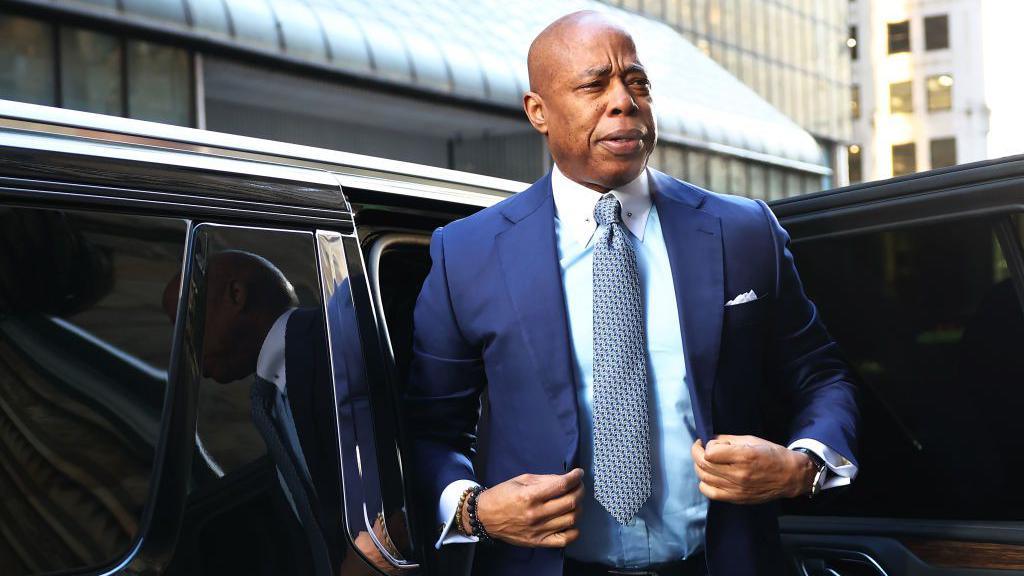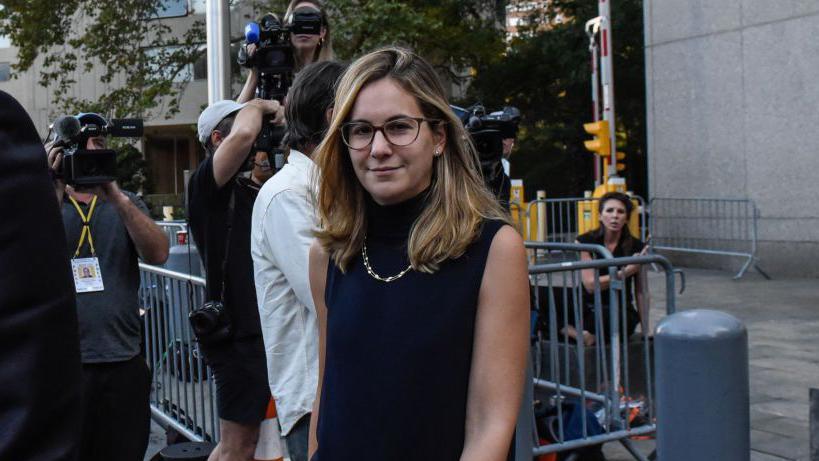Who is Emil Bove, Trump's former lawyer and pick for lifetime judge?

Emil Bove, a top Justice Department official, at his Senate confirmation hearing to discuss his nomination to be a federal appeals court judge.
- Published
In a dramatic protest earlier this month, multiple Democratic US senators stormed out of a committee hearing mid-debate.
Only one remained: Senator Cory Booker, who stayed at the Judiciary Committee hearing only to excoriate his Republican colleagues for "trying to rush through one of the most controversial nominees we've had under this presidential administration."
At the heart of the spectacle was Emil Bove III, Donald Trump's former personal attorney and his pick for a lifetime position as a federal appeals court judge. The Senate paved the way for a final vote on his nomination on Tuesday night. He was confirmed to the judgeship in a 50-49 vote.
The president has appointed several personal attorneys and political allies to top posts at the justice department and the Federal Bureau of Investigation. But he nominated Mr Bove for the Third Circuit Court of Appeals, where he could conceivably review one of hundreds of lawsuits against the Trump administration. The lifetime tenure also could extend his influence long after Trump's term.
Trump has said Mr Bove will "end the Weaponization of Justice." But Democrats like Booker, and hundreds of former federal prosecutors, allege that appointing a Trump loyalist for life compromises the judicial system's integrity.
Mr Bove, however, told US senators at his confirmation hearing in June, "I am not anybody's henchman."
"I am not an enforcer. I'm a lawyer from a small town who never expected to be in an arena like this," said Mr Bove, who was born and raised in upstate New York and attended Georgetown Law School.
From Trump's attorney to top lieutenant
For six weeks in spring 2024, Mr Bove was a constant presence at Trump's side as the once and future president stood trial in Manhattan on 34 felony counts of falsifying business records. He ultimately was found guilty on all counts, becoming the first former US president convicted of a felony.
While his co-counsel Todd Blanche – now deputy attorney general – channelled the president's combative energy in multiple showdowns with the judge and witnesses, Mr Bove took a quieter yet forceful approach in defending the president.
He knows courtrooms well. Mr Bove was a federal prosecutor in the country's most prestigious division, the Southern District of New York (SDNY), from 2012 to 2021, promoted to leadership positions in narcotics and terrorism units in 2019.
Over nine years, he prosecuted cases including multimillion dollar fraud schemes, and convicted a cocaine trafficker – also the brother of Honduras' president at the time.
"If you want somebody who's going to hit the ground running, he's the guy," former SDNY colleague, Brendan Quigley, told Reuters in February. "He's not one to shy away from a fight."
Yet a Politico report suggested his leadership tenure at the SDNY was rocky, with some former colleagues telling the outlet that he had a harsh and even "abusive" management style. An internal inquiry initially concluded he should be demoted, Politico reported, but the office did not follow through on the recommendation.
Asked about the report at his Senate confirmation hearing in June, Mr Bove said he was aware of the inquiry - "as well as the fact that I was not removed".
He called the characterisation a "whisper campaign" and "not accurate."
Trump had appointed Mr Bove to a powerful role managing daily operations at the justice department. He became the subject of an explosive February memo and resignation from New York federal prosecutor Danielle Sassoon.
She alleged Mr Bove's order to drop a felony case against New York City mayor Eric Adams was politically motivated and legally unjustified. Both Adams and Mr Bove have denied her accusations. The incident led to a mass exodus at the SDNY and justice department's Public Integrity Unit, which provides oversight on cases involving politicians.
A few weeks later, before a federal judge in New York he argued to dismiss Adams' case, which a judge ultimately allowed.
He also was in a whistleblower complaint by former justice department attorney Erez Reuveni, who was fired after he told a federal judge he could not provide legal justification for the removal of Kilmar Abrego Garcia, a mistakenly deported Salvadoran man.
In his 27-page complaint, Mr Reuveni alleged that Mr Bove raised the possibility judges would try to block such deportations, then "stated that DOJ would need to consider telling the courts 'f—you' and ignore any such court order."
After the complaint became public, Mr Blanche slammed it as "utterly false."
Democrats demanded more investigation, but Senator Chuck Grassley, the top Republican on the Judiciary Committee, accused Democrats of politicising the whistleblower complaint.
"Government lawyers aggressively litigating and interpreting court orders isn't misconduct — it's what lawyers do all the time," he said earlier this month.
"Emil Bove is an incredibly talented legal mind and a staunch defender of the U.S. Constitution who will make an excellent circuit court judge," White House spokesman Harrison Fields told BBC in a statement.
Former prosecutors opposed nomination
Many recently departed justice department staffers worry the agency has deviated from its historic independence from the White House. And they allege Mr Bove along with Mr Blanche and Attorney General Pam Bondi have driven that transformation.
Justice Connection, a group representing former federal prosecutors, published a letter signed by over 900 former justice department attorneys urging senators to "rigorously examine" Mr Bove's time at the agency.
"Emil Bove has been an architect and enforcer of many of the attacks on DOJ and its employees," Stacey Young, the group's executive director, said in a statement.
Federal courts remain the only serious check on Trump's executive power. As Trump battles in US federal courts over mass deportations and firing thousands of federal workers, his choice of Mr Bove makes some strategic sense.
"The president is reportedly upset that some of his first-term nominees haven't ruled his way, and it's not a surprise that he would nominate somebody like Bove, who prioritizes personal loyalty above all and is effective at doing that at the justice department," said Sara Zdeb, former justice department attorney who left in January and now teaches at Emory University School of Law.
All presidents appoint federal judges in ideological alignment with their administrations. But Trump - who has suggested judges have no power to block a president's agenda - may be attempting to go a step further, she said.
"Emil Bove's nomination sends an alarming, but unsurprising, signal that President Trump's future judicial nominees will be chosen based on their fealty to the president, not the rule of law," she said.
- Published15 November 2024

- Published11 February

